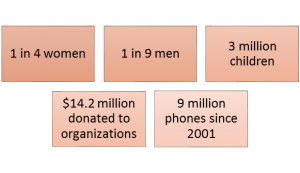
The Winona State University RE Initiative, a group which supports survivors of gender-based violence, encourages members to dig through their junk drawers and forgotten spots in their house to find old, broken or functioning cell phones and accessories such as chargers, headsets and extra batteries. Even if someone has a pager laying around, Verizon HopeLine will accept it.
The Verizon HopeLine is a phone drive which collects those cell phones and accessories and are then used to help victims of domestic violence. Verizon provides the phones with 3,000 minutes to domestic violence organizations.
Donation boxes are available around campus in the main offices of Lourdes, East Lake Apartments, the Well in the Integrated Wellness Center, and the Student Activities Center in Kryzsko Commons from March 1 to March 31.
Once the RE Initiative finishes the phone drive, the phones are sent to Verizon. Verizon sends the phones to a recycling company who recycles the phones. Verizon uses that money to buy new phones to send to domestic violence organizations, according to Meagan Dorsch, public and external relations lead for Verizon and the HopeLine program in Minnesota.
The extra money from the recycled phones is used for grant money to nonprofit organizations, Dorsch said.

Information from Verizon Wireless website: http://www.verizon.com/about/responsibility/domestic-violence-prevention
Brittney Leland, peer advocate from the RE Initiative worked to bring Verizon HopeLine to campus, along with PACT Graduate Assistant Mike Krug.
“I think it is needed because with my work in the RE Initiative as a peer advocate and educator,” Leland said. “I got called one time and one client was left with literally nothing and one thing she said would be helpful is a phone.”
To call a shelter to see if there is room, a phone is needed, it is an important tool to get people back on their feet, Leland said.
“[Phones] are the norm, those of us who have phones take it for granted and don’t realize how much of a privilege it is to have a phone,” Krug said.
According to the Centers for Disease Control and Prevention, one in every four women and one in every seven men have experienced severe physical violence from an intimate partner.
“Communication is the first thing victims lose,” Dorsch said.
Verizon began HopeLine in 2001, and since then have collected 12 million phones, with 700,000 in 2015.
HopeLine provided more than a dozen organizations across Minnesota with phones and grants in 2015. This number is looking to be very similar for 2016, according to Dorsch.
In 2015, $7,000,000 was given to domestic violence organizations. This money is the extra money from the recycled phone profits that Verizon receives. One of these organizations is Cornerstone, an organization that was established in 1983 to help victims of domestic violence in South Hennepin County and since has expanded to Northern Hennepin County and Minneapolis in Minnesota. They strive for reducing domestic violence, sexual violence and human trafficking.
Cornerstone has had a relationship with Verizon for a long time, and the two are partnered together, according to Courtney Poja, Director of Advancement for Cornerstone.
Poja said clients need safety, which is access to 911, help and shelters, a service support network, and stability once safe to rebuild their life. She also said the phones are used to achieve this.
Each client works with a Cornerstone staff member, and they decide who is in most need of a donated phone. 15 phones are given out every year, and Cornerstone serves 4,000 clients a year, Poja said.
In addition to giving out phones to victims, Cornerstone offers transitional housing options, help with rebuilding, therapy, help through the legal process, and operates a state wide crisis line to call to safety, according to Poja. Cornerstone also works with kids and has clinical services.
It’s awesome that Verizon does HopeLine, Poja said, she thinks it is really great that helping domestic violence victims is important to Verizon.
As of Friday, March 17, three phones and a charger have been donated on campus, according to Leland, which is slower than she expected.
Julie Chiasson, licensed practical nurse for WSU Health and Wellness Services donated a Tracfone that has been sitting in a drawer.
She saw the program in an email, and was appalled by the increasing amount of domestic violence. Chiasson is a member of the Women’s Resource Center, and wants to help out victims.
To donate an unused phone, erase all personal information and remove the sim card if possible. Bring it to any of the donation boxes around campus. They will be collected and picked up by RE Initiative members and locked away until they are sent to Verizon at the end of March.
Phones can also be donated at the Verizon store on Frontenac Drive before or after the March 31 campus HopeLine deadline. The phone and accessories can be from any provider, not only Verizon.